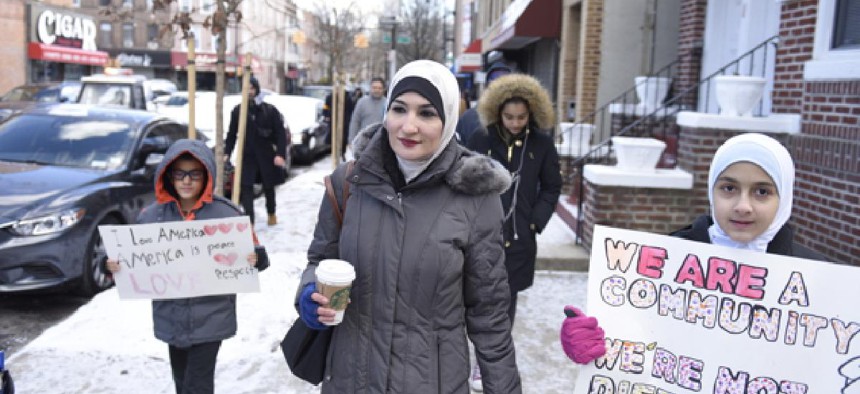New York Community Trust announces grants to counter Islamophobia

Photo: a katz / Shutterstock
In response to what it called a rising tide of bias incidents and Islamophobia, the New York Community Trust in June awarded more than $500,000 in grants to several Muslim American and South Asian advocacy groups that will be used to support – among other initiatives – media campaigns that counter stereotypes about Islam and the creation of a pipeline to unify and train community organizers across New York.
“As rhetoric was becoming more prominent and more vocal expressing negative sentiments towards American Muslims, and Muslims around the world, we began hearing from some of the nonprofits that we have relationships with that this was affecting New Yorkers,” Program Director Shawn Morehead said during an Aug. 9 roundtable. “And as much as – at least I as a New Yorker – like to think that as a city we are not affected by racism and bigotry, we are.”
The trust first worked with the Ford Foundation, the New York Foundation and other groups to talk about solutions, and got feedback from young Muslim New Yorkers.
The two-year grants were part of an $11 million funding round made to 80 nonprofits. In October the foundation will decide on another round of grants to Muslim and South Asian organizations working on “rights-based” advocacy and the Bangladeshi population, Morehead said.
“They are just like all other New York City youth: They want to be known for their interests, for their skills, for the things that they find interesting and the contributions that they make to their communities,” she said.
Instead of reaching out only to organizations it already knew, the Trust issued an open request for proposals to expand its reach, ultimately receiving about 35 proposals. It waded through them with advisors, who helped select programs to support or expand.
The Arab American Association of New York received $90,000 to connect Muslim leaders, organizers and advocacy groups. Linda Sarsour, the group’s executive director, said it was launching an October summit at New York University to train organizers, link groups and help the Muslim American advocacy community pivot from a reactionary model to a proactive one. She said that even since the RFP was released, Muslim Americans have needed to defend themselves from backlash stemming from a half-dozen major terrorist attacks, such as those in Orlando, Florida, and Nice, France.
“Every time we’re like, ‘OK, we’re in a vibe, here, we’re getting somewhere,’ and then immediately there’s a relapse in the community and then we kind of feel like we start over again,” she said, adding that despite some progress the groups made, its members still had to deal with threats in their community. “You’re building women leadership, but they still have to walk in the streets of their community and be spit at in the street, be harassed, be told to go back to their country,” she said.
In fact, on the day of the Trust’s roundtable, a mosque on Manhattan’s Upper East Side was vandalized, according to the Daily News.
The Institute for Social Policy and Understanding, based in Michigan, received $80,000 to research the professional contributions of Muslim New Yorkers. South Asian Youth Action got $80,000 to help teach leadership skills to boys up to 19 years old. The Asian American Writers’ Workshop, which encourages “literature at the intersection of migration, race, and social justice” was given $75,000 to help emerging Muslim, Arab and South Asian artists and writers. And Turning Point for Women and Families was given $80,000 to develop leadership and mediation skills. Tazmin Uddin, a coordinator with the group, said the grant will resume a youth-development program that was suspended in 2014 following a funding cut.
Other beneficiaries each awarded $50,000 included NYU, which will host cultural events and information sessions for all New Yorkers, as well as produce social media content to clear up misconceptions about Islam; Seftel Productions to produce a series of short Internet videos – “The Secret Life of Muslims”; and WNET to create an online resource and help teachers educate their classrooms about the religion.
Editor's Note: This article was updated to clarify when funding for Turning Point's youth-development program was cut.
NEXT STORY: Forecasting the 2016 state Senate races